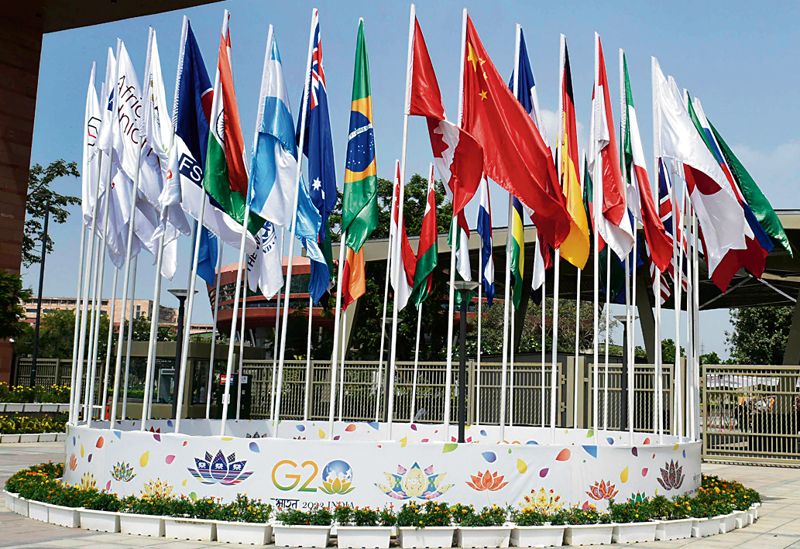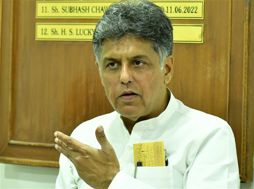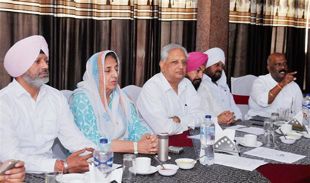
Outlook: India’s G20 presidency has been indicative of a representative and inclusive order. Tribune photo
Vikramjit Sahney
Rajya Sabha MP and Member, B20 Task Force on Future of Work, Skilling & Mobility
INDIA’s G20 presidency has been identified as the curtain-raiser to the expansion of the country’s global footprint. India is well acknowledged as the voice of the Global South. The unique flavour of G20 comes from the fact that it is an informal grouping with no charter or secretariat. It relies on consensus among its members to get things done. This, in itself, is an ambitious feat that the G20 has outlined for itself, given the diverse political inclinations, varying viewpoints and complex alliances among its member countries. Yet, they are striving to discuss inclusive economic cooperation among themselves. These 20 countries account for 85 per cent of the global GDP and 75 per cent of the global trade.
After the Covid pandemic, it has been globally realised that a human-centric approach is the key to a sustainable future with clear and coordinated efforts and assistance to the vulnerable. This has been emphasised by the cascading effect of the Russia-Ukraine war. It was only natural for India to subtly be the voice of the world, given the fact that we are culturally conditioned by the principle of ‘Vasudhaiva Kutumbakam’ and are also a steadily growing economy.
Earlier, India was part of the problem; now, it is being recognised as part of the solution, owing to reasons much beyond economics. The concern for human lives, the environment and food security is woven into the intrinsic cultural fabric of India, given its vast demography with immense diversity.
The year-long G20 meets in India are indicative of a representative and inclusive order where every nation plays a vital role. The G20 works at various levels to ensure that its objectives are achieved. In the trade sector, G20 has brought emphasis on immediate post-crisis recovery, while addressing financial regulation and macroeconomic stability. Attention has since shifted to the need to revitalise the global economy, laying stress on strong, sustainable and balanced growth.
Providing an environment conducive for engaging in profitable free trade, global value chain integration, improving infrastructure and job opportunities with a strong emphasis on enhancing MSME participation can boost economic growth.
With consensus, it has been decided that the main focus is to be on striking a balance between the interests of producers and consumers. The G20 accounts for half of the global inward Foreign Direct Investment (FDI) and two-thirds of the global outward FDI. Actions taken by the G20 also have an impact on developing countries outside the group’s ambit, with around 70 per cent of non-G20 developing countries’ imports coming from G20 nations, and around 80 per cent of those countries’ exports directed to the G20. Greater trade and investments are worthwhile only if they enable human resources to effectively boost the national economy. In the current scenario, there is a tremendous shift in the work ecosystem, with digitalisation and artificial intelligence being the cornerstones. Skilling, that too with an ethnographical approach, is the only sustainable way to make a transition, taking a cue from the latest report of the International Labour Organisation, which says that the global jobs gap stood at 473 million in 2022. It is a 33 million increase from 2019; the report states that this year, global employment growth will be only 1 per cent, which is less than half the level in 2022. Global unemployment is slated to rise slightly in 2023, by around 3 million. Deliberations have led to a roadmap for the development of an international skill gap mapping portal for the assessment of current and future labour market trends and skill needs.
Another major parameter is the nation’s health, which is linked to food and nutrition, which, in turn, are reliant on agriculture. Thus, agriculture is of paramount importance and more so in India’s context. There is unanimous agreement on a consumer-centric approach while ensuring food security amid disruptions. Another goal is to tackle price volatility to guard against inflation, protectionism and unrest due to food insecurity.
The Agriculture Working Group of G20 highlighted priority areas to encourage diversification in agriculture, promoting sustainable agriculture and channelling financial resources towards environmentally conscious and climate-resilient farming. The development of seed banks and the promotion of organic farming, while ensuring food security, have to take precedence.
Above all, the sustenance of trade and agriculture is strongly dependent on climatic conditions. Hence, concerns over climate change need to be addressed. The focus has been on curbing unsustained production and consumption patterns to deal with biodiversity loss and pollution, with ambitious actions being taken under the Paris Agreement.
The ‘Panchamrit’ strategy, unveiled by India at COP26 (Glasgow), was appreciated across the globe. India has adapted itself for a vital role globally to ensure a safe and sustainable planet. A strong push for renewable energy, exhaustive measures to reduce carbon emissions and carbon intensity of our economy and efforts for developing our non-fossil energy sources are a few illustrative examples. The Lifestyle for Environment (LiFE) is one such initiative.
Having touched upon major areas of concern, we can conclude that India’s G20 presidency seems to have achieved the desired outcomes. Various sessions so far have witnessed consensus on a transparent regime, ushering in free global trade in goods and services and enhanced investment in infrastructure, health, education, skilling, digital transformation and climate change mitigation.
With high hopes pinned on the practical implementation of ‘One Earth, One Family, One Future’, it is imperative that India leverages the outcomes to catalyse a global and domestic renaissance and gains a stronger foothold while overcoming geopolitical discord. Let’s hope that all members would agree on a collective approach to tackle multiple, complex and interconnected challenges, while keeping the aspirations and needs of the developing world at the forefront.
Join Whatsapp Channel of The Tribune for latest updates.




























